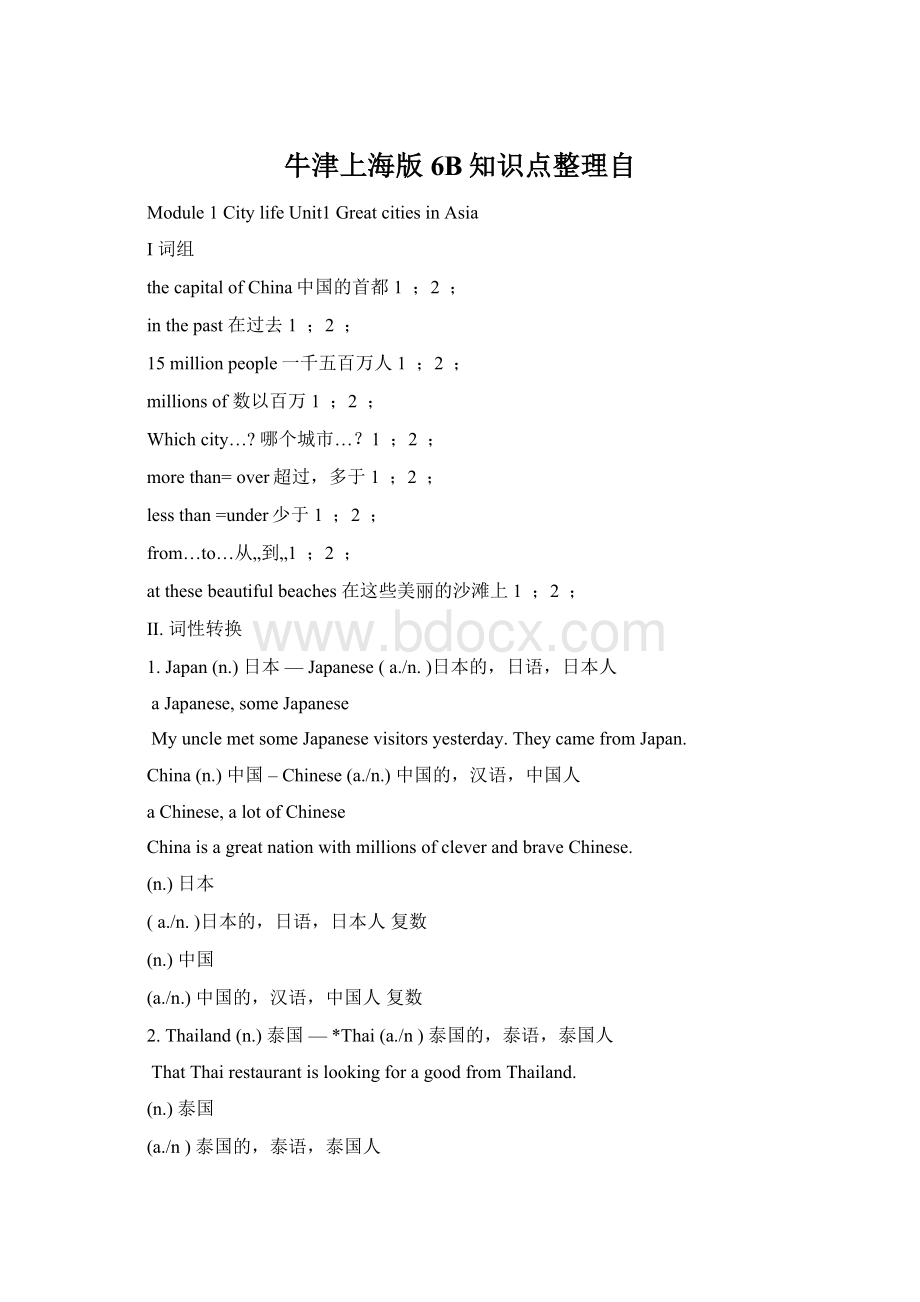牛津上海版6B知识点整理自.docx
《牛津上海版6B知识点整理自.docx》由会员分享,可在线阅读,更多相关《牛津上海版6B知识点整理自.docx(65页珍藏版)》请在冰豆网上搜索。

牛津上海版6B知识点整理自
Module1CitylifeUnit1GreatcitiesinAsia
I词组
thecapitalofChina中国的首都1;2;
inthepast在过去1;2;
15millionpeople一千五百万人1;2;
millionsof数以百万1;2;
Whichcity…?
哪个城市…?
1;2;
morethan=over超过,多于1;2;
lessthan=under少于1;2;
from…to…从„到„1;2;
atthesebeautifulbeaches在这些美丽的沙滩上1;2;
II.词性转换
1.Japan(n.)日本—Japanese(a./n.)日本的,日语,日本人
aJapanese,someJapanese
MyunclemetsomeJapanesevisitorsyesterday.TheycamefromJapan.
China(n.)中国–Chinese(a./n.)中国的,汉语,中国人
aChinese,alotofChinese
ChinaisagreatnationwithmillionsofcleverandbraveChinese.
(n.)日本
(a./n.)日本的,日语,日本人复数
(n.)中国
(a./n.)中国的,汉语,中国人复数
2.Thailand(n.)泰国—*Thai(a./n)泰国的,泰语,泰国人
ThatThairestaurantislookingforagoodfromThailand.
(n.)泰国
(a./n)泰国的,泰语,泰国人
3.exhibition(n.)展览会,展览—*exhibit(v.)
TheShanghaiExhibitionCentreisonYan’anRoad.
(v.)展览,展示
(n.)展览会,展览
4.build(v.)建造--building(n.)建筑物–*builder(n.)建筑工
Thousandsofbuildershaveworkedhardtobuildsuchawonderfulbuilding.
(v.)建造
(n.)建筑物
(n.)建筑工
5.tourist(n.)游客—tour(n.)旅游
Thosetouristsarewelcomedbylocaltouragency.
(n.)游客;(n.)旅游
6.information(不可数名词)
*apieceofinformationsomeinformation
SamandAndyarelookingforsomeinformationaboutforests.
(n.)消息、信息,是名词
一条信息
一些消息
III.语言点/句型
1.方位词:
east/west/north/south
north-east(东北)/north-west(西北)/south-east(东南)/south-west(西南)斜方向方位词与中文表述相反。
用法:
(…范围外面的)on/totheeastof;在(…范围内)的东面.intheeastof
a.两地不相邻,用介词to或不用介词:
-JapanistotheeastofChina.-TokyoiseastofBeijing
b.两地接壤挨着,用介词on:
-KoreaisontheeastofChina.
c.所属关系,在范围内用介词in:
-ShanghaiisintheeastofChina.
-TokyoiseastofShanghai.ShanghaiisintheeastofChina.
-BeijingisnorthofShanghai.ItisalsointhenorthofChina.
两地不相邻,用介词或;
-JapaniseastofChina.
-TokyoiseastofBeijing
两地接壤挨着,用介词;
-KoreaistheeastofChina.
所属关系,在范围内用介词;
BeijingisnorthofShanghai.ItisalsothenorthofChina.
2.thecapitalofChina中国的首都;of的两种含义
(a)of表示“的”thecapitalofChina/themapofmyschool/thepictureofme
(b)of表示”在…之中”(后用复数)one/some/many/all/noneoftheboys.
-BeijingisthecapitalofChinaanditisalsooneofthegreatcitiesinAsia.
3.That’sright那是对的;That’sallright没关系;Youareright你是对的;Allright好吧
A:
TokyoisthecapitalofJapan---------B:
That’sright./Youareright.
A:
Iamsorry.--------------B:
That’sallright.
A:
Pleaseopenthedoor----B:
Allright.
那是对的;没关系;你是对的;好吧
A:
TokyoisthecapitalofJapan---------B:
T./Youareright.
A:
Iamsorry.--------------B:
T.
A:
Pleaseopenthedoor----B:
A.
4.关于“半个的表达法”
半小时halfanhour
一个半小时onehourandahalf=anhourandahalf=oneandahalfhours(注意复数)
两天半twodaysandahalf=twoandahalfdays.
半小时
一个半小时=(注意复数)
两天半=.
5.byair=byplane乘飞机;bysea=byship乘船;注意同意表达
go/travel/getto…by…==takea/an…to
-Hegoestoschoolbycar.=Hetakesacartoschool.
乘飞机乘船
go/travel/getto…by…=
转换:
-Hegoestoschoolbycar.
6.how,howfar,howlong的特殊疑问句
✧howfar---“多远”问距离;-Itisabout1,400kilometers.Howfarisit?
✧how----“如何,怎样”(1问.by+交通工具2问.作表语的形容词)
-Igotoschoolbybus.-Howdoyougotoschool?
-Hebecamefitagain.-Howdidhebecome?
✧howlong“多长时间,多久了(问时长)”,以For+时间段或since+时间点作答
✧初中阶段用howlong的常见句型
Ø-Ittakessbtimetodosth
Ø-since+时刻点或从句
Ø-for+一段时间
Ø-不带not的until
1.Ittakesmeabout2hourstogetthere.-Howlongdoesittaketogetthere?
2.Ihavelivedheresincelastyear.-Howlonghaveyoulivedhere?
3.Ihavelivedherefor2years.-Howlonghaveyoulivedhere?
4.Ididmyhomeworkuntilmid-night.-Howlongdidyoudoyourhomework?
*5.(Iwon’tgotobeduntilIfinishmyhomework.)-Whenwillyougotobed?
not…until直到…才;"直至某时才做某事".Shedidn'tarriveuntil6o'clock.她直到6点才到.
✧Howsoon多久之后(问解决事情等的速度),用in+时间段作答
Howoften多经常(问频率),常以数词+timesaweek(month、year……)作答
“多远”问距离
“如何,怎样”(1问.by+交通工具2问.作表语的形容词)
“多长时间,多久了(问时长)”
多久之后(问解决事情等的速度)
多经常(问频率)
直到…才;"直至某时才做某事"
划线部分提问:
-Itisabout1,400kilometers.isit?
-Igotoschoolbybus.-doyougotoschool?
-Hebecamefitagain.-didhebecome?
1.Ittakesmeabout2hourstogetthere.-doesittaketogetthere?
2.Ihavelivedheresincelastyear.-haveyoulivedhere?
3.Ihavelivedherefor2years.-haveyoulivedhere?
4.Ididmyhomeworkuntilmid-night.-didyoudoyourhomework?
*5.Iwon’tgotobeduntilIfinishmyhomework.-willyougotobed?
7.morethan超过==over
-Therearemorethan12millionpeopleinShanghai.=Thereareover12millionpeopleinShanghai.
超过=
8.like/love/enjoy后跟动词ing;表“喜欢做某事”
-Myparentslovereadingnewspapers,IenjoywatchingTV,butmysisterlikesreadingbooks.我父母喜欢看报,我喜欢看电视,我姐姐喜欢看书。
✧wouldliketodoSth.愿意/想要做某事
✧enjoy,like,与love的区别如下:
like/love后接doing,todo两种都可以;Enjoy后面可接动词-ing形式,而不能接todo形式。
(√)Ienjoyplayingbasketball.
(×)Ienjoytoplaybasketball.
Like/lovedoingsth.表示“喜欢做某事”,一种长时间的喜好;Like/lovetodosth.也表示“喜欢做某事”,但表示偶尔性的喜欢。
-IlikewatchingTVafterdinner,butIliketoseeamoviethisevening.
我喜欢晚饭后看电视,但是我今晚喜欢看电影。
后接doing,todo两种都可以;
后可接do-ing形式,而不能接todo形式。
9.therebe句型表示某地方或者某时间有…
eg.Thereare15millionpeopleinBeijing.
Therewillbemuchrainnextmonth
注意therebe句型的各种时态
Therewas/were(过去时)(过去时)
Therewillbe/isgoingtobe(将来时)
Therehave/hasbeen(完成时)
eg.TherehavebeenalotofpeopleinShanghaialreadyandtherewillbemoreinthefuture.
10.TheseareallgreatcitiesinAsia.
all“(三者以上)所有”,放在be动词后,行为动词前。
eg.Tokyo,BangkokandBeijingallcomefromAsiaandtheyareallmyfavouritecities
“(三者以上)所有”位置在
11.Ittakes(sb.)sometimetodosth.做某事需要花费多少时间
e.g.Ittakesmefivehourstomakethismodalplane.做这个模型飞机花了我5个小时。
做某事需要花费多少时间
Unit2Attheairport
I词组:
1.arriveattheairport到达机场1;2;
2.arriveinLosAngeles到达洛杉矶1;2;
3.arrivehome/here/there到家/这儿/那儿1;2;
4.asilkscarf一条丝巾=>1;2;
severalsilkscarves几条丝巾1;2;
5.plentyofspace大量的空间1;2;
6.departuretime起飞时间;1;2;
arrivaltime抵达时间1;2;
7.oneandahalfhours=one/anhourandahalf一个半小时
1;2;
8.beforeoneo’clock一点之前1;2;
9.havetodosth.不得不做某事1;2;
10.drivesomebodytosomeplace开车送某人去某地1;2;
11.leaveA离开A地;1;2;
leaveforB出发去B地;1;2;
leaveAforB离开A地去B地1;2;
12.overthere在那里1;2;
13.aboardingcard一张登机牌1;2;
14.anametag一张姓名牌1;2;
15.writedown写下1;2;
16.liveinLosAngeles住在洛杉矶1;2;
17.enoughspace足够的空间1;2;
18.bigenough足够的大1;2;
19.toomanysweets太多的糖果1;2;
20.toomuchmeat太多的肉1;2;
21.buysb.sth.为某人买某物1;2;
=buysth.forsb.为某人买某物1;2;
II.词性转换:
1.fly(v.)飞,飞行→flightn.航班
e.g.Nextmonth,theywillflytotheUSA.TheirFlightNo.isMU6789.
(v.)飞,飞行1;2;
n.航班1;2;
2.departv.离开,出发→departuren.离开,启程
e.g.Ourparentswilldeparttomorrowmorning.Thedeparturetimeis9.00a.m.
v.离开,出发1;2;
n.离开,启程1;2;
3.passv.通过→passengern.乘客;旅客
e.g.Youcan’tpass.Stop,please!
Allpassengersmustobeytherules.
v.通过1;2;
n.乘客;旅客1;2;
4.trolleyn.手推车→(复)trolleys1;2;
5.arrivev.到达→arrivaln.到达
e.g.Thearriveltimeis3.00p.m.,sotheywon’tarriveat1.00p.m.
v.到达1;2;
n.到达1;2;
III.语言点/句型
1.AuntJudyandUncleMikehavelivedinLosAngelesforsixyears.朱迪阿姨和迈克叔叔已经在洛杉矶居住了6年了
①现在完成时:
sb.have/has+V.p.p(动词的过去分词)Sb.have/hasnotV.p.p.(否定句)Have/Hassb.V.p.p.(一般疑问句)
②havebeento去过,到过„„(表示现在已回)
havebeenin住在„„(+时间段)=havelived/stayedin
havegoneto去,到„„(表示现在还没有回,多用于第三人称)
e.g.IhavebeentoAmericabefore.我以前去过美国。
ShehasbeeninLondonfor2years.她已经住在伦敦两年。
WhereisMary?
Shehasgonetothelibrary.Mary在哪?
她已经去图书馆了。
去过,到过„„(表示现在已回)1;
住在„„(+时间段)1;
去,到„„(表示现在还没有回,多用于第三人称)1;
IAmericabefore.我以前去过美国。
SheLondonfor2years.她已经住在伦敦两年。
WhereisMary?
Shethelibrary.Mary在哪?
她已经去图书馆了
朱迪阿姨和迈克叔叔已经在洛杉矶居住了6年了1;
③Theyhavealreadydonealotofthings.-Tomhasn’treadthatbookyet.-Haveyoucheckedyourpassportyet?
―already意为“已经”,用于现在完成时肯定句,动词前
―yet意为“还,已经,仍”,用于否定句和疑问句,放于句末
―just刚刚(用法和位置和already相同)
“已经”,用于(肯定句、疑问句和否定句)
“还,已经,仍”,用于(肯定句、疑问句和否定句)
“刚刚”,用于(肯定句、疑问句和否定句)
④V.p.p.动词的过去分词:
bring—brought—broughtget—got—gotwrite—wrote—writtenbuy—bought—boughtput—put—putpack—packed—packedlive—lived—liveddo—did—done
2.MrsWangandGrandmaaregoingtoLosAngels,theUSA,thisSundaytoseeAuntJudyandUncleMike.
本例中使用了现在进行时表示“将来”的含义。
这样的动词常常是:
go,come,leave,moveetc.
e.g.Iamleavingnow.我要离开了。
-Thebusiscoming.Hurry!
公交来了,快点。
3.GrandmahasboughtAuntJudyplentyofT-shirtsandseveralsilkscarves.
buysb.sth.=buysth.forsb.
e.g.原句可以表述为:
GrandmahasboughtplentyofT-shirtsandseveralsilkscarvesforAuntJudy.
为某人买某物:
=
4.However,theyhavenotpackedtheirsuitcasesyet.
however:
可用于句首,句中,句末,前后常用“,”隔开,语气比but弱。
but:
用于句中
e.g.Shewasill,however,shestillwenttowork.Shewasill,butshestillwenttowork.
然而,但是,后面有逗号;后面没有逗号
5.WhattimedoesyourplaneleaveforLosAngelestomorrow?
leavesp.离开某地;leaveforsp.出发去某地;leaveAforB离开A地去B地
e.g.TheywillleaveShanghai.他们将离开上海。
-TheywillleaveforTokyo.他们将出发去东京。
-HewillleaveShanghaiforTokyo.
离开某地
出发去某地
离开A地去B地
6.arrive+in大地方(如国家、城市等范围较大的地方)e.g.arriveinChina/Shanghai…
arrive+at小地方(如车站、学校等小范围的地方)e.g.arriveattheairport/school...
【近义】getto,reach到达
到达(较大地方)
到达(较小地方)
7.plantodo计划做„„
e.g.TomisplanningtovisitRometh